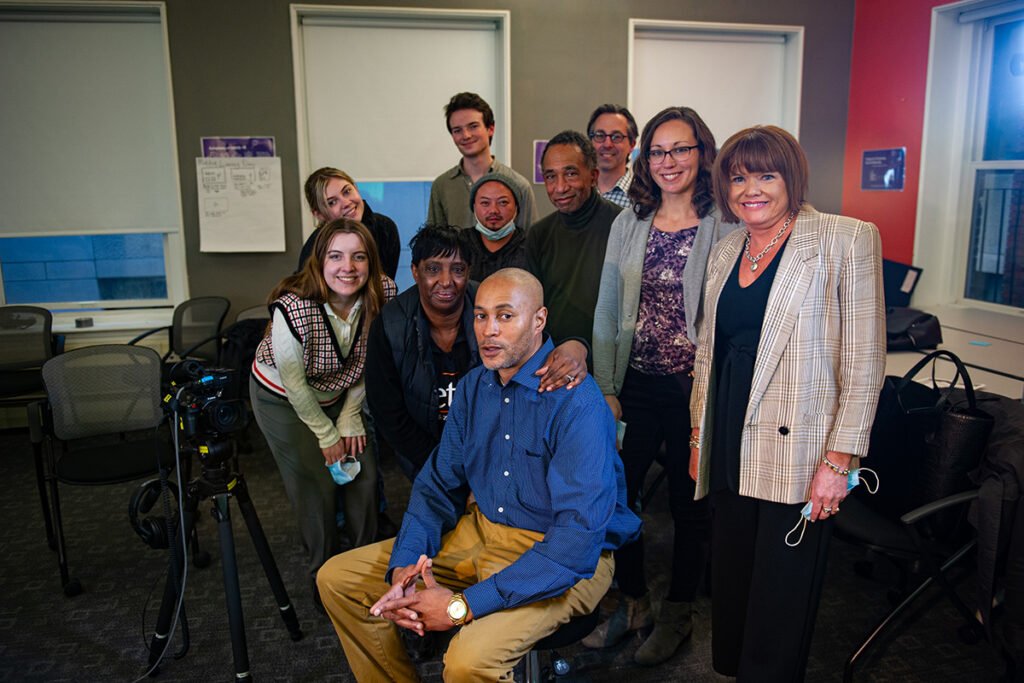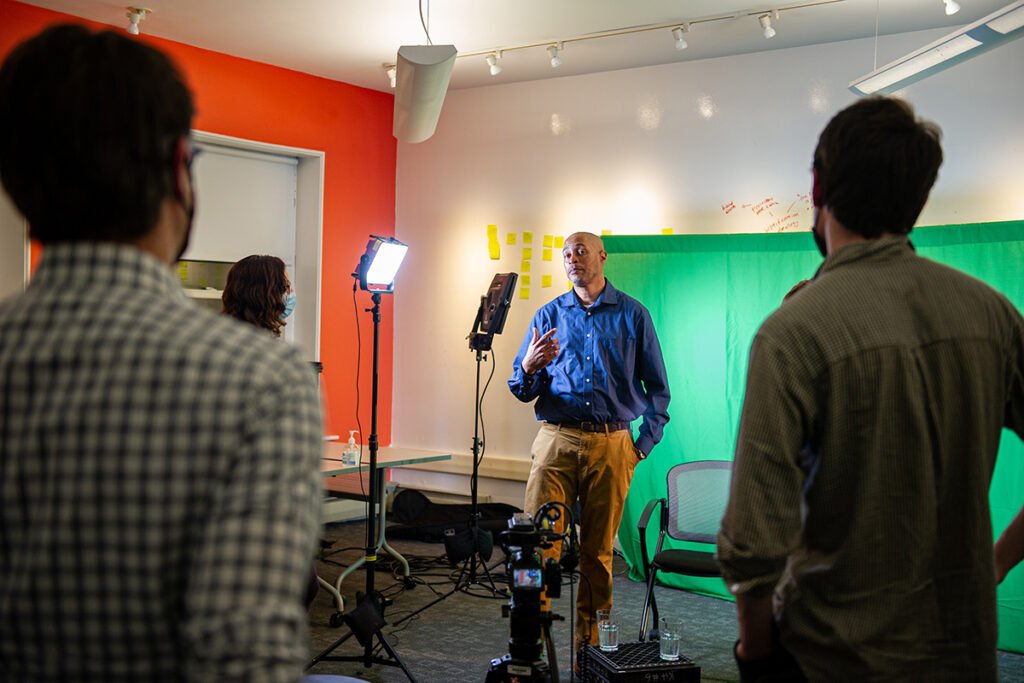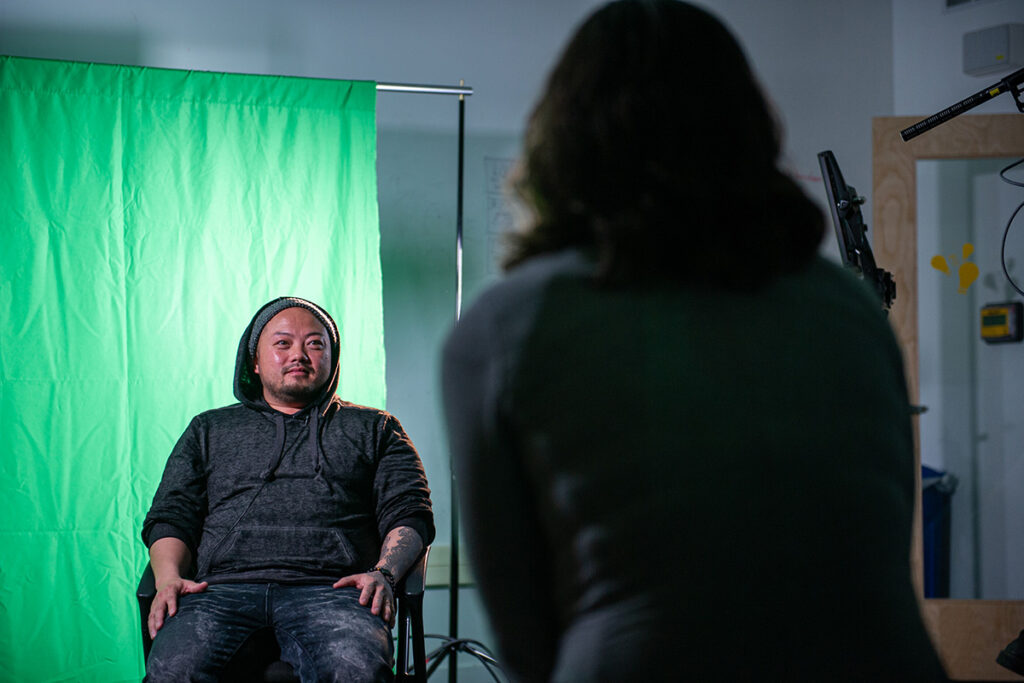Social Impact Studio Uses Filmmaking to Flip the Script on Gun Violence

In the fast-paced, ever-changing media landscape of today, the Engagement Lab at Emerson College works to understand and design media that challenges old, harmful narratives of social justice issues.
Their most recent project, Transforming Narratives of Gun Violence Initiative (TNGVI), involves a three-year partnership between the Engagement Lab, the Center for Gun Violence Prevention at Massachusetts General Hospital, and the Boston-based Louis D. Brown Peace Institute. The goal of the initiative is to bring people closest to gun violence – community members, academics, elected officials, and medical professionals, to name a few — to the forefront of the conversation.
“We want to shift the local dialogue away from the demonization of people of color and towards an acknowledgement and support of the community strength that exists within Boston’s neighborhoods. In other words, we want to move from a deficit to an asset frame. And ultimately, we want to change institutional practices,” Eric Gordon, professor of civic media and Engagement Lab director, said.
How it Works
The project involves two social impact studio (formerly, partnered studio) courses within Emerson College, a documentary film class taught by Senior Distinguished Director-in-Residence Regge Life and Gordon, and a Theatre Education course with Assistant Professor Dana Edell, along with a team of graduate students in Media Design. All courses bridge different mediums to connect thematically on the project, finding new ways to share personal stories of gun violence that center resiliency and new, ever-changing networks of community.

The results of those social impact studios will premiere on Tuesday, April 26, at an event from 5:00-7:00 pm at 80 Boylston St. The event includes live performances, a debut screening of a short documentary, and VR/360 video from this semester’s studios.
Register for Transforming Narratives of Gun Violence Spring Showcase
Olivia Goldberg, a student in the documentary film studio, said she was motivated to enroll in the program because of her passion for advocacy for social justice. She said the course was more work than she could have imagined, but ultimately so meaningful.
“In one semester, we have conducted around 12 interviews, created relationships with homicide mothers and other passionate community partners, learned about the current narrative surrounding gun violence, discussed goals for our project, tested out virtual reality, had discussion with surgeons and local policy makers, painted film strips to use in our documentary, the list goes on and on. And we are in the process of editing! It has been so impactful,” she said.
Learning Beyond the Classroom
Goldberg isn’t the first to recognize that what the Engagement Lab offers isn’t a traditional academic class.
“This is a different kind of class at Emerson,” Gordon said. “In addition to enrolled Emerson students, two women — mothers of homicide victims — are auditing our class and have attended each session. And two other women, one who works at the Peace Institute and one who works at MGH, are also auditing. Emerson students have worked side by side with those with direct experience with gun violence and have appropriately felt the responsibility to be good collaborators,” he reflects.
Gordon believes the ability to listen is a great strength that has allowed his students to succeed both within the program and in the real world of social activism. “They have navigated difficult situations as people have shared their personal stories of tragedy and resilience. And they’ve done this by listening well. Not by speaking; not by showing up as the expert storyteller; they’ve just listened,” he says.

Goldberg sees listening as another way to contribute to the conversation of social change through honoring the experiences and voices of those who should be heard.
“We are using the metaphor of the Quiet Room, the cold room in which families receive the news about the death of their children. We are using this idea of quiet, not to hide voices, like this room exists to do, but to use silence as a tool for listening, connecting, and growing. These strong survivors have certainly taught me that, and so much more,” she said.
Transforming the Narrative
Carla Sheffield is one of the survivors the studio has been listening to. Nearly 10 years ago, Sheffield’s son, Burrell Anthony Ramsey, was shot and killed by police after a routine traffic stop. For the past decade, her son’s story has been told largely through the lens of the police and the news media. But this past January, Chaplain Clementina Chéry, founder and CEO of the Louis D. Brown Peace Institute, asked Sheffield if she would participate in the TNGV initiative.
This winter and spring, Sheffield found herself not just sharing her story and that of her son, but learning skills she never thought she’d use. As executive producer of the documentary, she has set up interviews, edited video and worked in virtual reality film.
“I feel like the powers that be can learn something, and [TNGV] might actually be able to change the narrative around gun violence,” Sheffield said.
Taking away the guns won’t fully solve the problems in Black and Brown communities unless you replace those guns with education, steady jobs, safe housing, and a feeling of being loved and valued, she said.
“I am glad that Tina asked me to be part of this project, because I have learned so much stuff I never thought I’d be a part of,” Sheffield said. “I feel like if this was put out into the community instead of a gun, the potential we would see in these Black and Brown babies…
“Now I know what I can do, and I can tell my son’s story,” she said.
Another student in the program, Cole Tatham, enrolled in the studio to further explore social impact documentary storytelling, which he discovered in Assistant Professor Rashin Fahandej’s class, Beyond Mass Incarceration. He noted the structure of the Engagement Lab program forces students to go beyond a traditional documentary-style class.
“On production days, we’d go to places like the Louis D. Brown Peace Institute and MGH to film these interviews, and I’d hear a dozen things that are going to stick with me for the rest of my life,” Tatham said. “In particular, I want to thank Carla and Leeann [Taylor], our community partners, who take time out of their busy schedules working and taking care of family to meet with us in person once a week. It is really a privilege to know them.”
Looking Ahead
Next semester, the Engagement Lab looks forward to offering VM495, exploring immersive media in partnership with the Peace Institute; and VM300, a course in game design, taught in collaboration with Teen Empowerment.
Additionally, next year, the Engagement Lab will be launching a new initiative, Transforming Narratives for Climate Action, which will involve six or seven studio programs a year in active collaboration and partnership with environmental justice organizations in the Boston area.
Erin Clossey contributed to this story.
Categories